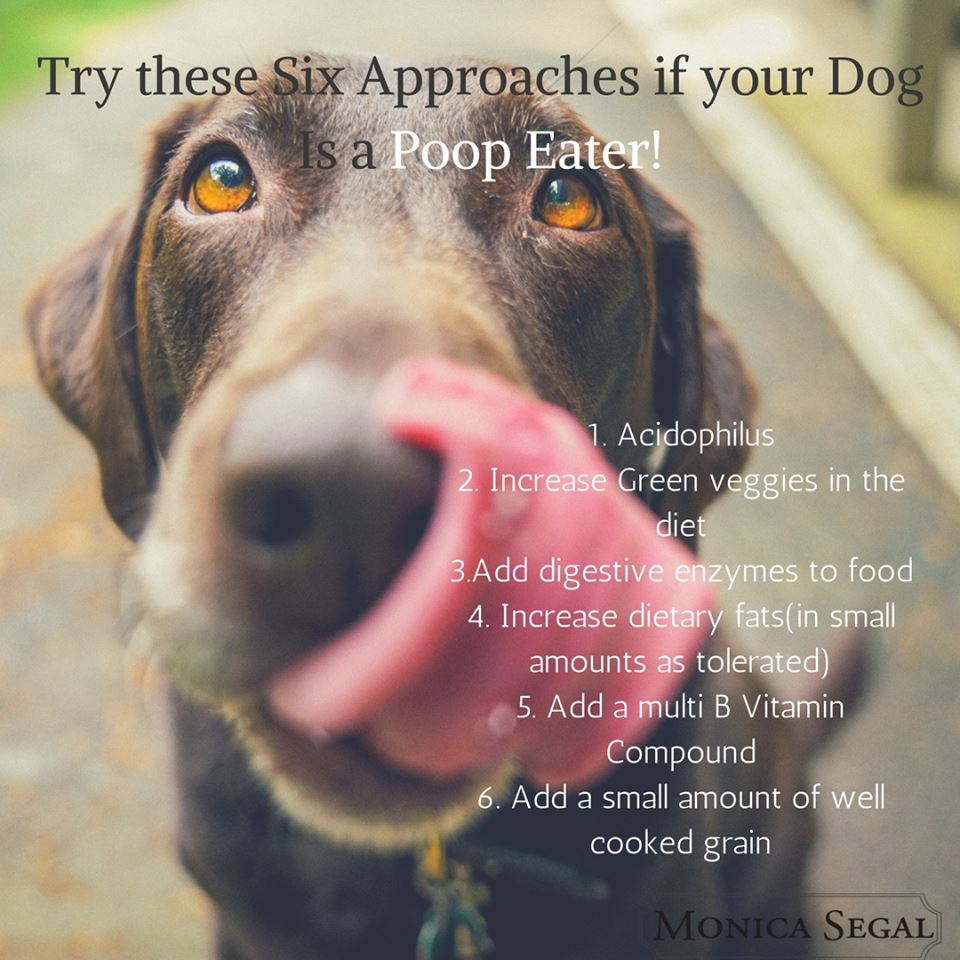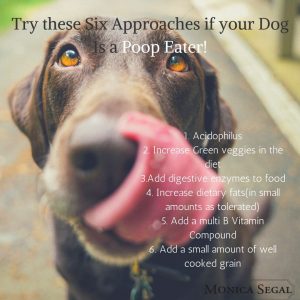Why does my dog eat poop? How do I stop my dog from eating poop?
These are two very popular questions that dog owners with poop eating dogs ask on a daily basis.
Why dogs do it is unknown. Regardless of who says otherwise, it’s really not factual. Some say it’s because puppies see their mothers doing it when mom cleans the pups, and they start to imitate her. Others say dogs eat stool because instinct drives them to remove anything that might identify them to another dog, or different species. Yet others claim it’s due to the diet being fed (which actually can have some impact), or that the dog is missing something in the diet.
So we put this graphic on our Facebook page as well as the K9Kitchen Group on Facebook.
1. Acidophilus
2. Increase green vegetables or add alfalfa powder in the diet
3. Add digestive enzymes to food
4. Increase dietary fat (assumes dog tolerates this) in small increments
5. Add a multi B vitamin compound
6. Add a small amount of well-cooked grain
One addition is made per week. No need to continue adding anything else on the list once the behavior stops.
People started asking why each item was noted. Why would adding any of these items stop a dog from eating poop? What’s the rationale behind the suggestions?
First, let me say that it doesn’t work for all dogs, but certainly try it because many, many clients have seen success. Secondly, pick up the feces as soon as the dog has finished doing his/her business. The dog can’t eat poop if there’s none to be found. That said, some dogs are lightening fast about it.
Let’s get to the reason for every item on this poop-eating-dog list.
There’s bacteria in dog feces. The probiotic acidophilus is found in the gut of dogs, and some is shed in the poop. By feeding acidophilus you are actually accomplishing two things. The first is you’re adding beneficial bacteria to your dog’s digestive tract. The second is that you’ve introduced something that mimics what is in the feces. Add it daily for one week. If the dog stops eating poop, you don’t need to do anything else, but keep adding acidophilus to food.
There’s undigested matter in stool, and depending on the dog’s diet, some may be fiber. By adding a little green veggie you’re mimicking what stool may have in it, but you’re also offering something your dog may crave, or need. Healthy dogs don’t have a need for veggies, but they can certainly make good use of the antioxidants they offer. Add a little green veg (steamed and finely minced broccoli is often a good choice) as roughly 1/2 tsp. per 10 pounds of bodyweight. Introduce this in tiny amounts, increasing slowly. Feed green vegetable for 1 week. If the poop eating behavior stops, there’s no need to do more, but do continue to feed the acidophilus and green veg from now on.
Digestive enzymes aid in digesting food. Some people say to add pineapple to the dog’s diet because it contains enzymes. Others say pineapple works because it makes the stool taste bad, so the dog no longer wants it. I’ve always wondered how people would know what dog poop tastes like, but I digress.
Digestive enzymes in supplement form can be excellent for some dogs because it helps them digest and assimilate nutrients. In many cases that’s what seems to have been lacking at least to some degree, so the addition stops the behavior. There are two types to consider. For dogs that are allergic to pork, plant-based enzymes are preferred. For a medium size dog, you can sprinkle 1/2 capsule on food, mix well, and let the food sit for 15 minutes before serving. The idea is to allow the supplement to “predigest” some of the food. The full spectrum enzymes include a protease (the enzyme that helps to break down protein) derived from pork. This product is stronger – but used in the same way as the plant-based. Use the enzymes for one week. If poop eating behavior stops, great – no need to do anything else, but do continue the steps outlined so far.
Feces has some fat in it. Trying to replicate what the dog may find tempting, fat is often a big driver of the behavior. The glitch is that not all dogs tolerate much fat added to their existing diet, and the type of fat matters. Due to being metabolized differently from other fats, coconut oil can be used here. Organic, cold pressed coconut oil as 1/4 tsp per day for every 15 pounds of body weight. Try it for one week. If the behavior stops, there’s no need to do more, but do continue the steps above.
B vitamins play critical roles including digestion and metabolism of proteins, fats, and carbohydrates. The addition of B vitamins can help for these reasons. I use tablets which can be cut with a knife, or pill cutter. I find a pill cutter makes life easier. Inexpensive at any pharamcy, and they last for years. All B vitamins can cause nausea if given on an empty stomach. Tuck it in hand held food to be fed as a treat after a meal. I use 1/8 tablet per day for dogs up to 25 pounds, 1/4 table for dogs 26-60 pounds, and 1/2 tablet daily for lager dogs. Try this for one week. If poop eating stops, you don’t need to do anything more, but do continue the steps above.
Lastly, try a small addition of overcooked brown rice, or quinoa. Why add grain? Because some dogs are attracted to poop that has undigested hulls, grains, husks etc. in it. Others simply stop eating stool after having a bit of grain in food, but the reason escapes me. It doesn’t seem to take much grain to work. Even 1 tsp (cooked amount) per 15-20 pounds of bodyweight can have positive impact. How do you cook rice, or quinoa? Rinse them several times (quinoa has a bitter coating, natural as it is, that’s easily rinsed away). Boil in more water than directed. Rice should be mushy before you consider it done. Quinoa “tails” should be open. Try this for one week and continue all the steps above if you’ve seen results.
Reminder: cat poop and herbivore poop is simply too much of a delicacy as far as dogs are concerned. I’ve yet to see one be deterred if they want that poop. Don’t beat yourself up if that’s the battle you’re trying to win, but in the case of dogs eating their own poop, or that of other dogs – the steps above should help.


